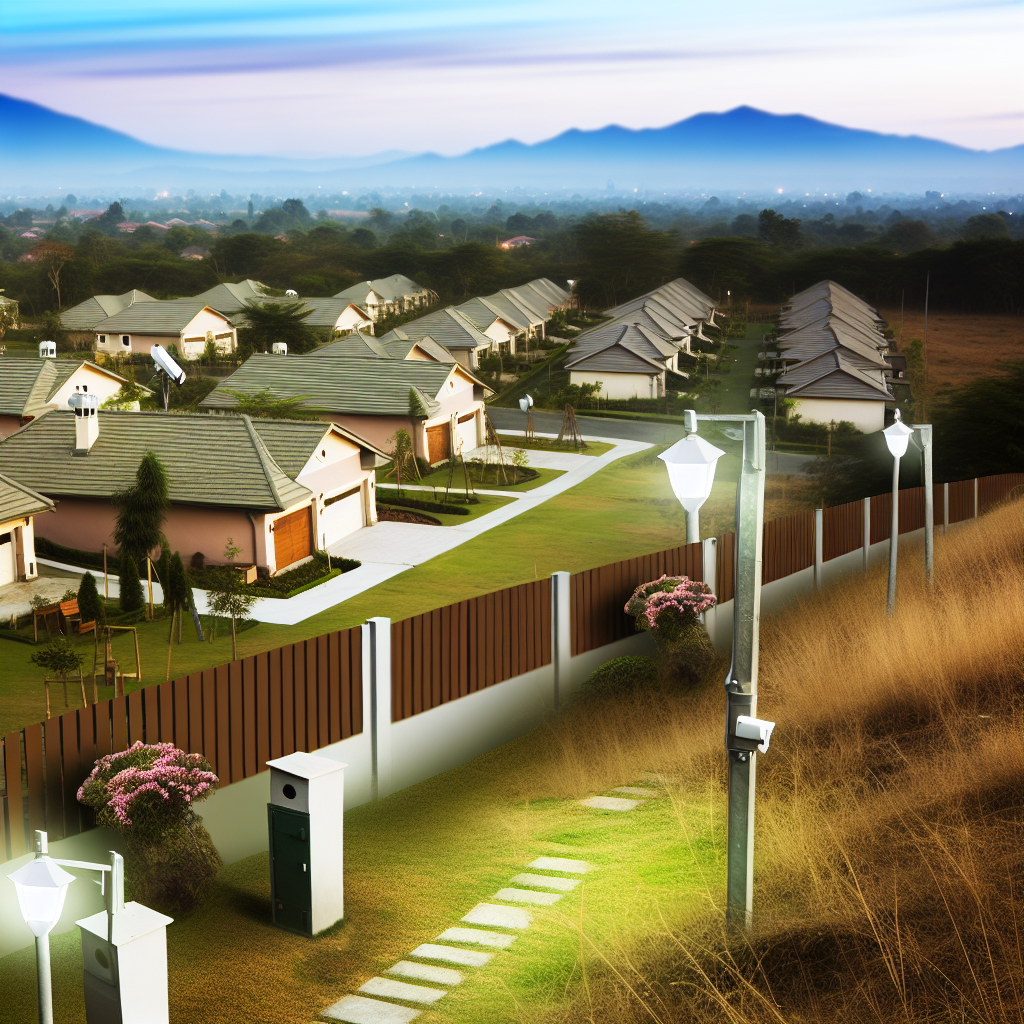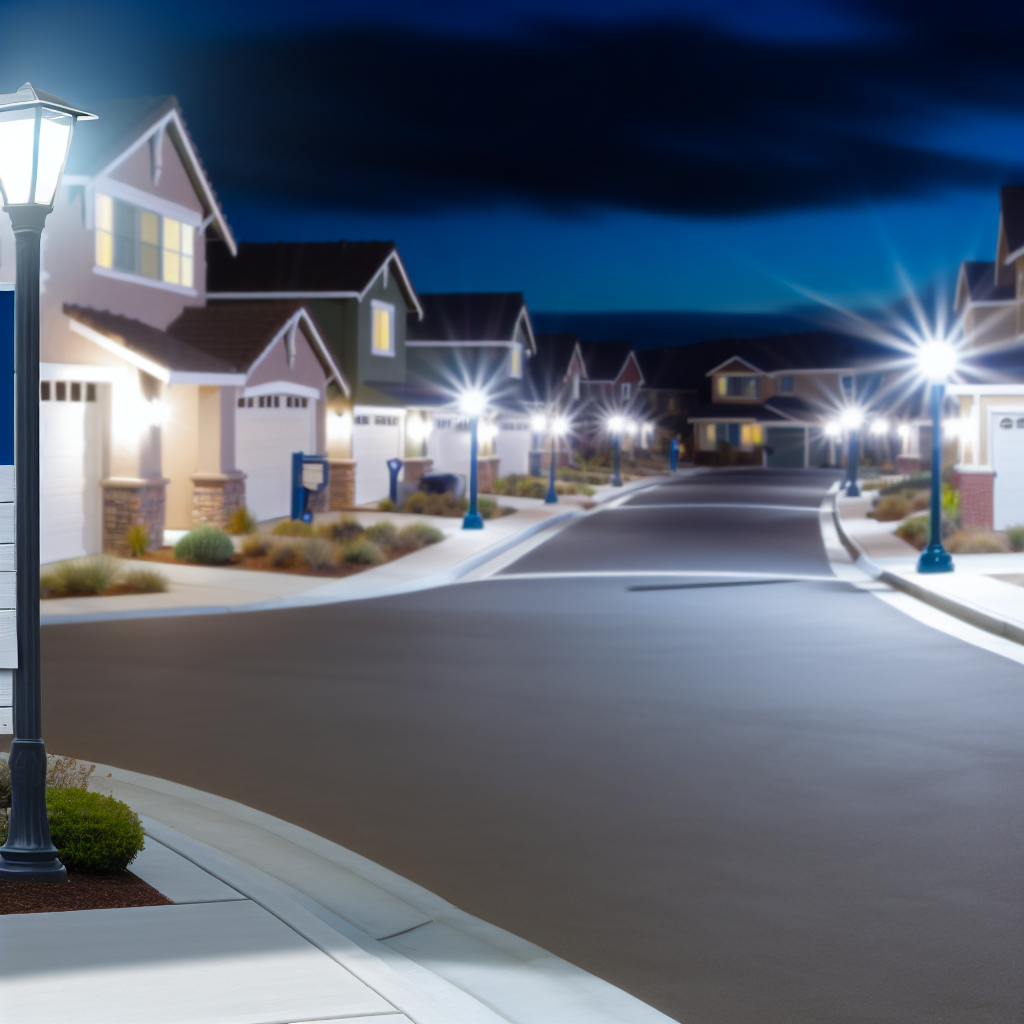“Protect your home and loved ones by prioritizing neighborhood safety. Take action now and maximize your residential security with American Security and Protective Services. Click here for a free quote and ensure your home’s protection today.” Click here
The Importance of Neighborhood Safety in Residential Security
In today’s world, where crime rates are on the rise, ensuring the safety and security of our homes has become a top priority. We install security systems, lock our doors, and take other precautions to protect our homes and loved ones. However, one aspect that is often overlooked is the importance of neighborhood safety in residential security.
Neighborhood safety refers to the overall safety and security of a particular area or community. It encompasses various factors such as crime rates, presence of law enforcement, and community involvement. The safety of our neighborhood can have a significant impact on the security of our homes. Let’s delve deeper into why neighborhood safety is crucial for residential security.
First and foremost, living in a safe neighborhood can provide a sense of peace and security. When we know that our community is well-protected, we can feel more at ease in our own homes. This sense of security can also have a positive impact on our mental well-being. On the other hand, living in an unsafe neighborhood can cause constant fear and anxiety, making it difficult to feel safe even within the confines of our homes.
Moreover, a safe neighborhood can act as a deterrent for potential criminals. Criminals are less likely to target a community where they know there is a strong sense of security and vigilant residents. This is because they are aware that their chances of getting caught are higher in such areas. As a result, the overall crime rates in a safe neighborhood are lower, making it a more secure place to live.
Another crucial aspect of neighborhood safety is the presence of law enforcement. A strong and visible police presence can significantly contribute to the security of a neighborhood. It not only deters criminals but also provides a sense of reassurance to the residents. In case of any emergency, the response time of law enforcement is also quicker in safe neighborhoods, increasing the chances of preventing or resolving any potential threats.
Furthermore, community involvement plays a vital role in ensuring neighborhood safety. When residents are actively involved in their community, they are more likely to look out for each other and report any suspicious activities. This can create a strong sense of unity and solidarity within the neighborhood, making it a safer place to live. Community involvement can also lead to the implementation of safety measures such as neighborhood watch programs, which can further enhance residential security.
In addition to the direct impact on residential security, neighborhood safety can also have indirect benefits. For instance, living in a safe neighborhood can increase the value of our homes. Potential buyers are more likely to invest in a property located in a safe and secure neighborhood, making it a valuable asset. This can also lead to a stronger and more stable community, as residents are invested in maintaining the safety and security of their neighborhood.
In conclusion, neighborhood safety is a crucial aspect of residential security. It not only provides a sense of peace and security but also acts as a deterrent for potential criminals. The presence of law enforcement and community involvement can further enhance the safety of a neighborhood. Therefore, it is essential to prioritize neighborhood safety and work towards creating a secure and peaceful community for ourselves and our loved ones.
How Smart Home Systems Can Enhance Home Protection

In today’s world, where technology is constantly advancing, it’s no surprise that smart home systems have become increasingly popular. These systems offer a wide range of benefits, from convenience to energy efficiency. However, one of the most significant advantages of smart home systems is their ability to enhance home protection and maximize residential security.
One of the main ways that smart home systems can enhance home protection is through their ability to monitor and control various aspects of the home. With the use of sensors, cameras, and other devices, these systems can detect any unusual activity and alert homeowners immediately. This real-time monitoring allows for quick action to be taken in case of a break-in or other security threat.
Moreover, smart home systems can also be integrated with other security features such as door locks, motion detectors, and alarms. This integration allows for a comprehensive security system that can be controlled remotely through a smartphone or other devices. This means that homeowners can keep an eye on their homes even when they are away, providing them with peace of mind and a sense of security.
Another way that smart home systems can enhance home protection is through their ability to automate various tasks. For example, lights can be programmed to turn on and off at specific times, giving the illusion that someone is home even when the house is empty. This can deter potential burglars who may be scouting the neighborhood for easy targets. Additionally, smart home systems can also control the temperature and adjust it according to the homeowner’s preferences, making it seem like someone is home.
Furthermore, smart home systems can also be integrated with voice assistants such as Amazon Alexa or Google Home. This allows homeowners to control their security system through voice commands, making it even more convenient and user-friendly. With just a simple voice command, homeowners can arm or disarm their security system, lock or unlock doors, and even check the status of their home’s security.
Aside from enhancing home protection, smart home systems can also ensure home protection by providing homeowners with valuable information. These systems can track and record data such as when doors are opened or closed, when motion is detected, and even when appliances are turned on or off. This information can be accessed through a smartphone or other devices, giving homeowners a better understanding of what’s happening in their homes. In case of any suspicious activity, this data can also serve as evidence for the authorities.
Moreover, smart home systems can also be integrated with other safety features such as smoke detectors and carbon monoxide detectors. In case of a fire or gas leak, these systems can automatically alert the homeowner and the authorities, allowing for a quick response and potentially saving lives.
In conclusion, smart home systems offer a wide range of benefits, and one of the most significant advantages is their ability to enhance home protection and maximize residential security. With real-time monitoring, automation, integration with other security features, and access to valuable information, these systems provide homeowners with a comprehensive and efficient way to protect their homes. As technology continues to advance, it’s safe to say that smart home systems will play an even more significant role in ensuring the safety and security of our homes.
The Role of Security Monitoring and Surveillance in Maximizing Residential Security
In today’s world, where crime rates are on the rise, ensuring the safety and security of our homes has become a top priority. As homeowners, we want to feel safe and protected in our own living spaces. This is where the role of security monitoring and surveillance comes into play. By implementing these measures, we can maximize residential security and ensure the protection of our homes.
Security monitoring refers to the use of technology to keep an eye on our homes and alert us in case of any suspicious activity. This can include CCTV cameras, motion sensors, and alarms. These systems are designed to detect any potential threats and notify the homeowner or the security company immediately. With the advancement of technology, these systems have become more sophisticated and can be accessed remotely through smartphones or other devices.
One of the main benefits of security monitoring is the deterrence factor. Knowing that their homes are being monitored, potential intruders are less likely to attempt a break-in. This is because they know that their actions will be recorded and they will be caught. In fact, a study by the University of North Carolina found that homes with security systems are three times less likely to be targeted by burglars.
Moreover, security monitoring also provides a sense of peace of mind for homeowners. With the ability to monitor their homes remotely, they can check in on their property at any time, whether they are at work or on vacation. This can be especially reassuring for those who have children or elderly family members living with them. In case of an emergency, they can quickly alert the authorities and ensure the safety of their loved ones.
Another important aspect of maximizing residential security is surveillance. This involves the use of cameras to monitor and record any activity in and around the house. Surveillance cameras act as a visual deterrent for potential intruders and can also provide valuable evidence in case of a break-in. They can also be used to monitor the comings and goings of visitors, ensuring that only authorized individuals have access to the property.
In addition to deterring crime, surveillance cameras can also help in identifying and catching perpetrators. In a study by the University of Leicester, it was found that CCTV cameras were effective in reducing crime rates and aiding in the prosecution of criminals. This is because the footage captured by these cameras can be used as evidence in court.
Furthermore, surveillance cameras can also be used to monitor the safety of our neighborhoods. By installing cameras in public areas, we can keep an eye on any suspicious activity and report it to the authorities. This can help in preventing crimes such as vandalism, theft, and even violent acts.
However, it is important to note that security monitoring and surveillance should not be the only measures taken to maximize residential security. These systems should be complemented by other security measures such as proper lighting, secure locks, and regular maintenance of the property. It is also crucial to educate ourselves and our families on safety measures and to always be vigilant of our surroundings.
In conclusion, security monitoring and surveillance play a crucial role in maximizing residential security and ensuring the protection of our homes. These systems not only act as a deterrent for potential intruders but also provide a sense of peace of mind for homeowners. By implementing these measures, we can create a safer and more secure environment for ourselves and our families.


